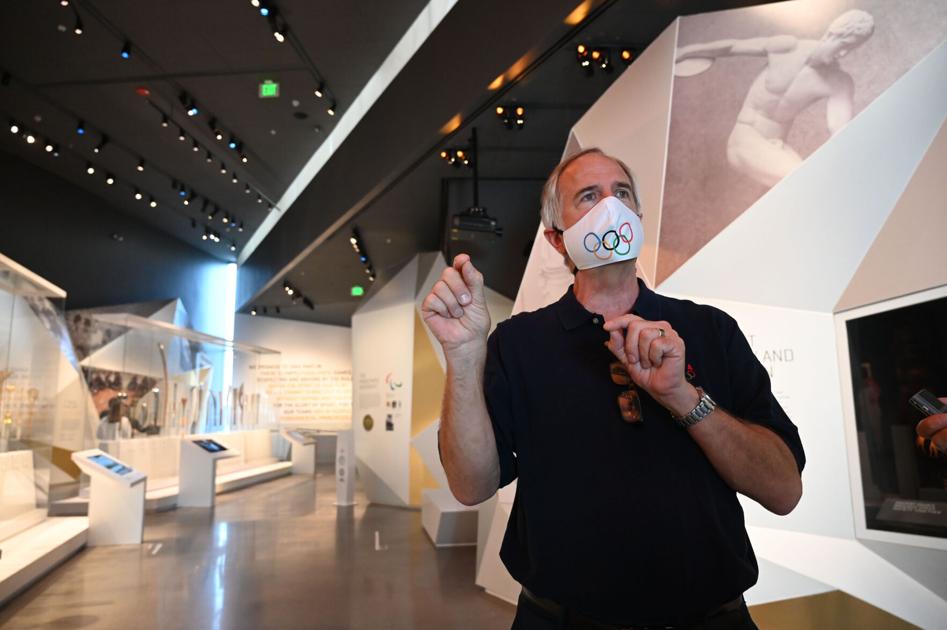
An elite athlete must believe she/he can defeat every other athlete on Earth to win an Olympic gold medal.
And, in 2020, that athlete must believe that while she/he goes about all this winning the opponent known as COVID-19 will fail to rear its vicious head.
The Olympics are scheduled next summer in Tokyo after a yearlong delay, but only the most extreme optimist believes COVID-19 will be tamed by July 2021.
But, remember, elite athletes are extreme optimists.
John Naber is visiting Colorado Springs this week for the opening of the downtown U.S. Olympic and Paralympic Museum. He’s an expert on the mindset of the elite athlete. He won four gold medals in swimming at the 1976 Montreal Olympics, and earned a place in the Olympic Hall of Fame.
“Well, for an athlete to train with the intent of winning a medal, they have to be overly optimistic to begin with,” Naber says. “The odds of winning an Olympic medal are worse than winning your state lottery.
“So, you begin with that understanding. They either think that they are bulletproof or inherently destined for greatness and that will slant how they view the virus.”
In certain sports, the virus that dominates our lives might not be a massive threat. If you’re a swimmer or shooter or distance runner, the threat of COVID-19 is not overwhelming.
But if you’re a basketball player or wrestler or boxer competing in close proximity to opponents — often face to face — the danger multiplies.
The danger is real. More than 675,000 have died from COVID-19 worldwide with more than 155,000 deaths in the United States. The threat of COVID-19 means the Tokyo Games might never happen.
The lure of a medal is real, too. A medal serves first as inspiration and later as justification for turning over a life to a sport. A medal can transform a relative no-name to international celebrity.
Rulon Gardner stepped on the wrestling mat at the 1980 Sydney Games with no chance — zero — of conquering unconquerable Russian Aleksandr Karelin. After a dramatic 1-0 gold medal victory, Gardner stepped off the mat as Olympic legend. Soon, bountiful endorsement offers were headed his way. His life changed in a few minutes.
Alison Dunlap grew up in suburban Denver and graduated from Colorado College. She competed in cycling at the 1996 and 2000 Olympics. She understands the juggle current American athletes face. These athletes must balance a quest for Olympic gold with wise respect for their health.
“It is heartbreaking, but it is the Olympics,” Dunlap says. “They are going to find a way to make it work. It is the best sporting event in the world.”
Dunlap believes leaders of the Tokyo Games will work diligently to protect the health of athletes.
But, she asks, what of the road to Tokyo? An athlete must compete at many different venues while seeking an Olympic berth.
“All those events,” she says. “That means getting on a plane, that means competing and now you’re compromised when you get on that plane to go home.
“The risks are very real. There are probably athletes who will say they are done. The risks are too high.”
Naber offers a different view. The mind of an elite athlete, Naber says, is focused on victory and little else.
“I don’t think many Olympic hopefuls are afraid of getting the virus or afraid of the consequences,” he says. “They are not saying, ‘I won’t work out because I’m afraid I’m going to get it.’ They are saying, ‘I’ll find a way to be successful.’”
And the athletes who focus on the risks of COVID-19?
“They probably were not Olympic material anyway,” Naber says.
"accept" - Google News
July 31, 2020 at 07:30PM
https://ift.tt/3k0Hea4
Will Olympic athletes accept risk of coronavirus? | David Ramsey - Colorado Springs Gazette
"accept" - Google News
https://ift.tt/2YsXkRf
https://ift.tt/3d2Wjnc
Bagikan Berita Ini














0 Response to "Will Olympic athletes accept risk of coronavirus? | David Ramsey - Colorado Springs Gazette"
Post a Comment